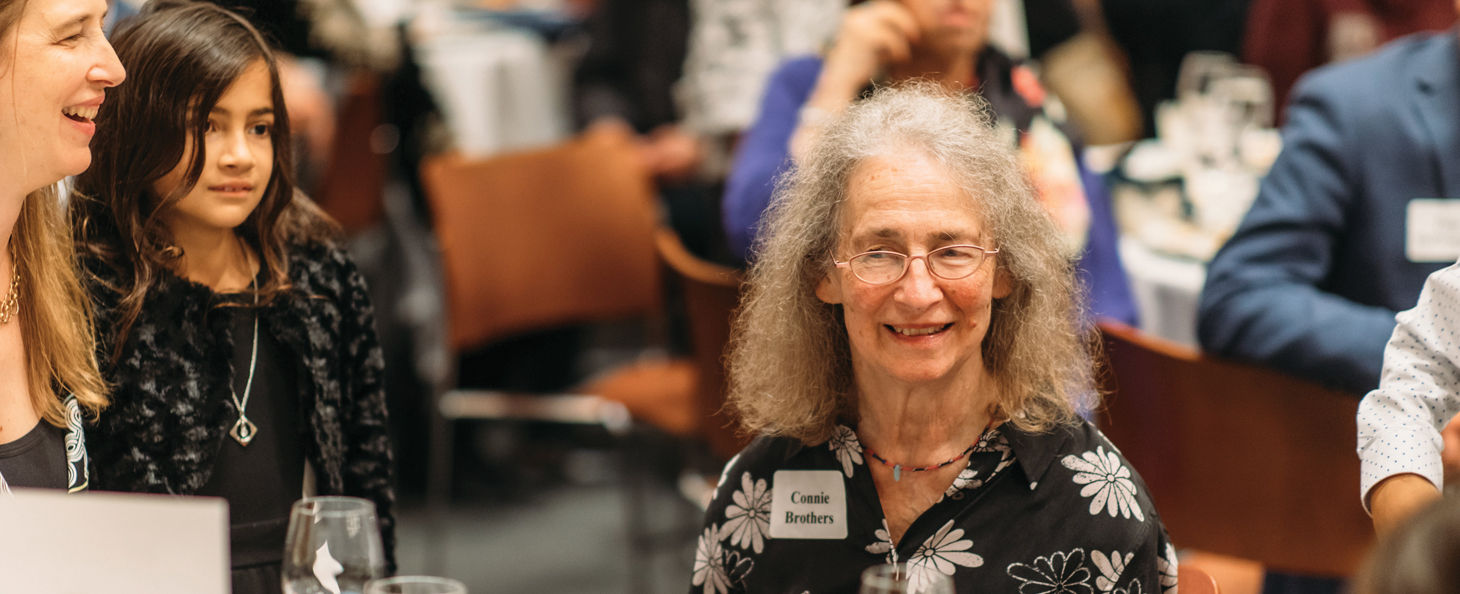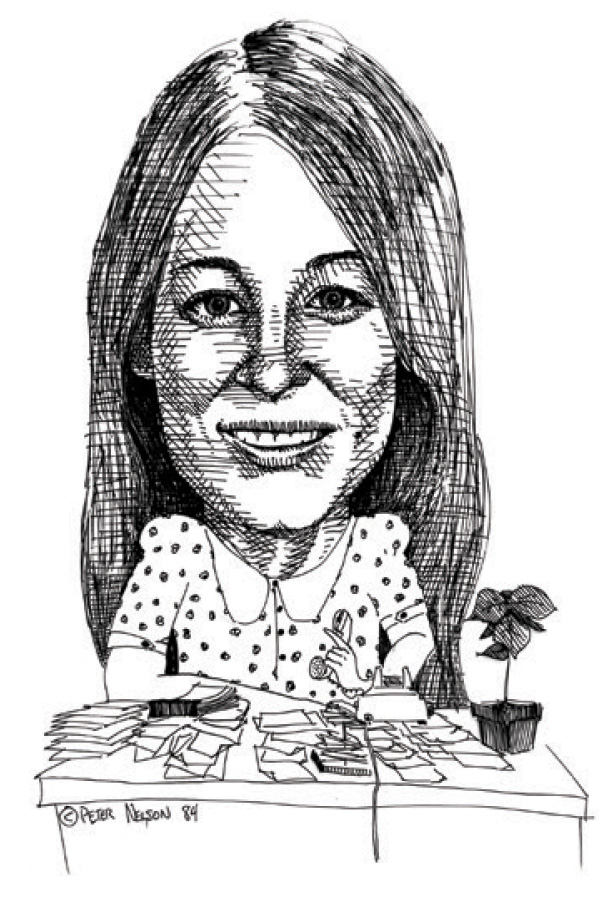Remembering the Iowa Writers’ Workshop’s ‘Compass in the Wilderness’
 PHOTO: DAN ROLLING
Former workshop chief administrator Connie Brothers
PHOTO: DAN ROLLING
Former workshop chief administrator Connie Brothers
Five percent.
Arriving in Iowa City in the summer of 1977, I have 5% stuck in my head. Somewhere I heard that only 5% of the people who graduate from the Iowa Writers’ Workshop go on to become writers. I want to be one of them, but I have no reason to assume I have what it takes. I don’t know if geniuses know they are geniuses, but I can say with certainty that those of us who aren’t know we’re not.
What I don’t know is—I have a guardian angel. Her name is Connie Brothers, and she is the workshop’s administrative assistant. At the welcoming barbecue, she smiles at me benevolently and says, “Let me know if you have any questions.”
“What shall I do with my life?” I want to ask.
***

I get on Connie’s radar when I’m invited by a fellow student, a woman from India named Priyanka whom I don’t know well, to a dinner party. “I will be cooking chicken tikka masala and rogan josh and…” She details the whole menu. “I know sometimes you play the guitar at parties, and people have fun singing songs, and I was hoping you could bring your guitar. My apartment is too small, so it will be at [Iowa Writers’ Workshop director] Jack Leggett’s house, and everyone in the department will be there. Saturday night. Can you come?”
“Sure,” I say. “What time?”
“I was hoping you could come about 10:30.”
Wait.
What?
10:30?
Oh. Not for dinner. But I will lose too much face to say “no” now.
When I arrive, it’s worse than I think. The entire faculty and their spouses are here, as is Connie, who smiles apologetically, as if to warn me. When I pick up my guitar, nobody wants to sing, and worse still, Vance Bourjaily wants to play his trumpet. Vance is a dear sweet man, but he is, to the trumpet, what Florence Foster Jenkins was to opera, and somehow, it’s the sour notes, the ones that are flat or sharp or just wrong, that he savors, wah-wah-ing the bell of his horn with his hand. I end up at a spinet piano, fumbling my way through the pages of a Real Book, and I am a lousy piano player, barely a step beyond “Chopsticks”; to play a song, I have to look at the chord on the page, look down and laboriously move my left hand, then my right, then look up at the next chord. … It’s horrible. It’s embarrassing. After we finish “Bye Bye Blackbird,” I try to leave, only to hear Vance insist, “Let’s try ‘Georgia.’ … Let’s do ‘My Funny Valentine.’” Every song is worse than the one before. Over my shoulder I see the pain on the faces of Jack Leggett and Donald Justice (54PhD) and Marvin Bell (63MFA), but Vance won’t quit.
Finally, it ends. I grab a beer and sit in the corner, thinking, “Maybe this is good—I have touched bottom. I will never be more publicly humiliated. It can’t get worse.”
But Priyanka makes an announcement.
“That was lovely. Now I have a special treat for you all, because my best friend is visiting from India, and she is the concert pianist with the Calcutta Symphony, and she will now play some Chopin!”
As I leave, Connie rubs my arm reassuringly and offers a weak smile.
***
My second year, I fall in love, and Connie is worried about me, probably because I am so conspicuously smitten. My obsession is Margaret (not her real name). I have a dozen rivals vying for her attention (she is that girl in the new cohort), but my advantage is, I propose that Margaret and I quit smoking together, a habit I’ve had since middle school. We do, and it works—we become a couple, and I am quickly an emotional goner. Every second away from her, every moment apart, I crave to see her again. I feel an impossible urgent yearning-longing-keening-pining-aching-need to be with her.
I think this is what true love feels like.
Actually, this is what nicotine withdrawal feels like. It’s love too, but the nicotine withdrawal isn’t helping.
A year later, when I sit with Connie in the River Room at lunch, she checks in with me, asking, “How are you guys doing?” Connie has seen so many workshop couples come and go, optimistic young people hoping to form one of those legendary literary partnerships, like F. Scott Fitzgerald and Zelda or … okay, not that one, but there has to be somebody.
Connie knows something I don’t.
She knows I’m doomed.
I’m out of the program, while Margaret is still going to workshop parties and events. Connie sees Margaret talking to (and flirting with?) men who are not me. Connie sees everything.
“Are you and Margaret living together?” Connie asks. “How’s that going?”
We sleep in the same bed and pay rent on the same space, but we don’t eat meals together or talk or have sex. Most nights, I am out drinking with my friends. I have blown this.
“It’s going great,” I tell Connie.
“Are you getting married?” Connie says, calling my bluff.
“Um…”
***
When I make a poster for a friend’s reading, Connie hires me to make posters for the workshop readings. I was a studio art major as an undergraduate. It works like this: She gives me a photograph, and I make a caricature on acetate. When I have four drawings, I take my materials and 100 sheets of 40-by-60-inch cardstock across the river to the Art Building, around midnight, after hours, and I let myself into the silk screen room via a basement window I unlocked earlier in the day, because I’m not an art student and I’m not supposed to be in the building. I squeegee through the night, and when the prints are dry, I cut the sheets into quarters, until I have 400 posters, for which Connie pays me $160. It doesn’t sound like a lot of money now, but it was then. Over the years, I do about 80 posters total.
One day I get a call from the editor at the Press-Citizen, recently bought by Gannett Media. He offers me a job as an editorial cartoonist, but the catch is, I have to sign a two-year contract, and I have to move to El Paso, Texas. I’ve been to El Paso. It’s really hot there.
The problem is, I can’t stay in Iowa City, because Margaret has left me for another man, a new guy in the workshop. To avoid running into each other, we divide the town up, but the situation is untenable. I cry all the time, heartbroken and lost. I’m living in a windowless basement studio on Gilbert where I can hear the spiders at night.
But El Paso?
Then the hand of Connie intervenes.
A new award has become available, a Michener Grant, but you can’t apply for one, and nobody knows how to get one. I discuss this at the bar one night with Don Hendrie Jr. (67MFA), a new teacher in the workshop. I ask him if he’s involved in the Michener awarding process, and he says he is. I ask him if he’d be willing to read the novel I’m working on, about a young writer whose girlfriend leaves him. He says he will, but he doesn’t know me from Adam. I am not his student. I’m a local bartender.
It must have worked like this. He knew I did the posters. He would have asked Connie, “What do you know about this Pete Nelson kid—is he any good?” And she would have spoken on my behalf. I can’t see any other way it could have worked.
A few weeks later, Connie tells me I’ve received a Michener, intended to give recipients the time they need to establish themselves as writers. It’s $625 a month for 12 months, and it will mean eating Hamburger Helper four days in a row, and living without health or car insurance, but I will start publishing in Esquire and Outside and Harpers and Playboy and Rolling Stone magazines.
Before I leave town, I stop by Connie’s office to say goodbye, and she says what might be the most meaningful thing anybody has ever said to me.
“I’ve seen a lot of people come through this program,” she says, “and I know you’re going to be one of the ones who make it.”
I will be one of the 5%.
Her words are still with me.
***
Connie Brothers passed away in February 2025 after spending 45 years administering the Iowa Writers’ Workshop, teaching TAs how to run the ditto machine, making travel arrangements for visiting writers, ordering wine and cheese for post-reading receptions, finding housing for students, putting out fires (smelling the smoke before anybody else does), weathering tantrums, fielding angry phone calls from people whose applications were rejected, drying tears, breaking bad news, bouncing on her heels with good news, and assuaging fragile egos in a high-stakes graduate writing program where egos are often overinflated and easily bruised, without ever exhibiting an ego of her own.
At Connie’s retirement celebration in 2019, former workshop faculty member Francine Prose called her “a model human.” Poet James Galvin (77MFA) called her “the emperor of empathy.” Current workshop director Lan Samantha Chang (93MFA) called Connie “the workshop’s secret superpower.” Connie Brothers was a compass in the wilderness, a one-woman HR department, a Buddhist yenta, the soul of discretion and a keeper of secrets, but for every dark secret she took to her grave, she took 100 light ones, favors she did for people who never knew she’d done them. She protected us, even when we didn’t know we needed protecting, or perhaps especially then.
***
The last time I see Connie is 2010. I am in town on a book tour. Connie comes to my reading at Prairie Lights, and her smile is as bright and as warm as ever. We go out after and catch up, and I tell her of my wife and son, my career as a freelancer. I talk a lot more about me than she does about herself. She talks of her daughter Cammy, but mostly, she deflects. She wants to know about me.
I realize something meaningful.
I have made her proud of me.
The truth is, I don’t know who I would have been without her.
Possibly a cartoonist in El Paso.

